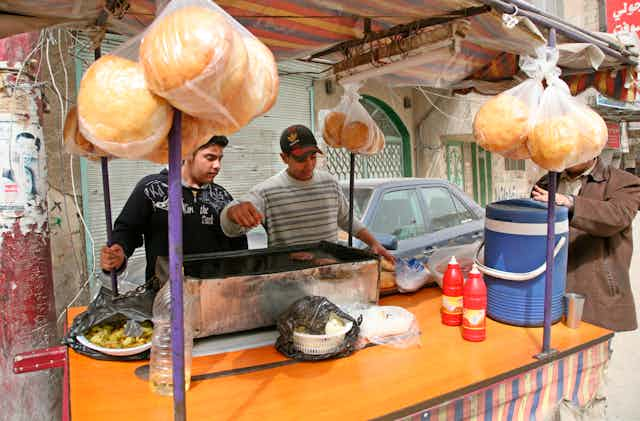In the last 12 months Maria Sorkhi started a photography business, Sima Mahboobifard began selling leather bags, the Dendo brothers - Rony, Luay and Duraed - began their photography and videography business, while Bassam Jabar set up a business to sell his art work.
At first glance these are just everyday stories of entrepreneurs in Australia. What sets them apart is that they have only been in Australia since 2013. They arrived not as wealthy business migrants, but as penniless refugees from Iran and Iraq.
Newly arrived refugees are at first glance the most unlikely candidates to start up a business less than two years after arriving in Australia. They have no capital, no credit history, no assets to mortgage, and no security, lacking the financial capital necessary for a startup.
These refugees all have stories of displacement from their homelands and are recognised as refugees under the UN Convention. They are not economic migrants.
Their educational qualifications are often not recognised meaning they often can’t get a job or, if they do, get one well below their ability. Most have no social networks of established family and friends to provide capital, advice and support, lacking the social capital that many non-refugee immigrant entrepreneurs in Australia have been able to draw on. Newly-arrived refugees also have little or no knowledge of the Australian rules and regulations and red tape that all new entrepreneurs must overcome. They also have little familiarity with the local market and business opportunities – informal knowledge so critical to new entrepreneurs. Their English-language fluency is usually not strong.
Refugees face the highest unemployment rates of non-Indigenous Australians. The traditional model to assist budding entrepreneurs is that they enrol in MBA courses. Here they study economics, finance, accounting, marketing and management to gain all the business knowledge that starting-up a business requires.
But there’s more than one way to facilitate an enterprise. And successful entrepreneurship programs have shown attributes such as passion, determination, intelligence, and resourcefulness are just as important as business skills.
Refugees, like many immigrant minorities, move into entrepreneurship because of blocked mobility: starting a business is perhaps their only point of access to the Australian economy because of formal or informal racial discrimination in the labour market.
Indigenous entrepreneurs also move into entrepreneurship in response to racial discrimination, but in their case it also constrains their activities as entrepreneurs: one recent national study found only 9 of 248 Indigenous entrepreneurs had been able to access bank finance.
Australia has a strong tradition of refugee entrepreneurs. Westfield founder Frank Lowy, one of Australia’s richest men, was a 15 year-old refugee from a war-devastated Slovakia.
Huy Truong arrived in Australia on a small fishing boat carrying him and 40 other Vietnamese people in 1978 at the age of seven. His father was an ethnic Chinese businessman with an import business. In 1999 Truong set up the gifting site wishlist.com.au with his wife and sisters, which was sold to Qantas in 2012. Truong is now a private equity investor.
Tan Le is another boat person from Vietnam. Le co-founded the company Emotiv - a producer of headsets that read brain signals and facial movements to control technology in computer games or apps. She then co-founded SASme, a pioneering business that provided platforms for the SMS applications market and employed 35 employees worldwide.
The refugee entrepreneurs introduced in the first paragraph will probably never achieve such business success. They are the first cohort of graduates of the Ignite small business startups initiative established in 2013.
To date 129 refugees from 25 countries have entered the program – seven out of ten are males. Most come from countries in the Middle East, with most from Iran (33), Iraq (20) and Syria (10). Businesses range from clothing alterations, fashion design and hat retail to car/motorcycle sales, carpentry and joinery, services, art and import businesses. To date around 30 new businesses have been established or are nearly there.
Another successful program assists micro business startups for women of refugee and migrant background. The Brotherhood of St Laurence Stepping Stones initiative saw 60 women from the Australian business community recruited, trained and matched with program participants.
Next year Australia will see the arrival of 12,000 Syrian refugees in addition to some 13,000 existing refugee arrivals. The Sydney Ignite model and the Melbourne Stepping Stones programs are tried and tested and should be rolled out in urban and regional centres across Australia.

